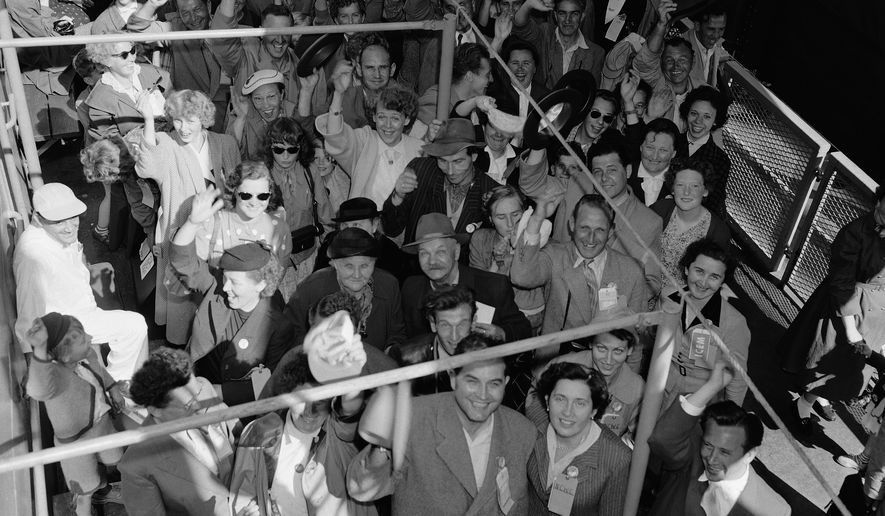OPINION:
“The immigrants watched helplessly as the angry crowd spit out epithets at them, little children clinging to their mothers’ skirts for safety. It had been a long, arduous journey, and at the other end, they met nothing but rejection and hatred.”
Anyone reading the above could be forgiven for thinking that this is a tale either from our Texas border or from a southern California town where federal authorities were bussing Central American kids who had crossed the border illegally.
Actually, it’s my own fictionalized account of true events that took place in Boston, in 1729, as a mob blocked immigrants on ships from Londonderry and Belfast from coming ashore. The tale, however, has much to say about today’s immigration battles.
These immigrants were Scots-Irish. They shared the same Northern European pinkish hue as the protesters. Also like most Massachusetts natives, the new arrivals were Protestants. Indeed, they were Presbyterians, cut from the same Calvinist cloth as the Congregationalists of New England.
Still, the descendants of our Pilgrim Fathers derided them as “those confounded Irish.”
Other immigrants were treated even worse. The Catholic Irish weren’t allowed to settle at all in the early colonies. Germans, too, were feared. Ben Franklin worried that they “will shortly be so numerous as to Germanize us instead of our Anglifying them.”
Somehow, they all ended up succeeding through their own determination and perseverance and without the federal government apportioning their representation in the labor market, government contract, universities or society in general.
Throughout our current divisive immigration debate, liberals keep pounding the table and lecturing the rest that “we’re a nation of immigrants,” as if conservatives had somehow missed this key part of the nation’s tradition. It’s actually liberals who can’t see the implications of what being a nation of immigrants means.
As Linda Chavez wrote long ago, the history of American ethnic groups, “is one of overcoming disadvantage, of competing with those who were already here and proving themselves as competent as any who came before.”
But we no longer do it this way. In its infinite wisdom, the federal bureaucracy decided in the 1970s that it had to intervene in the process.
Through laws and administrative actions, Washington’s different departments and agencies lumped different immigrants from Latin America under the banner of “Hispanic” — a term that hadn’t been used in this fashion in Latin America or Spain. The bureaucracy did the same to people as varied as Japanese, Filipinos and Cambodians, whom it labeled “Asians.” In all, four new “minority” groups were created.
The explicit intention, according to Public Law 94-311 in 1976, was to “implement an affirmative action program for the employment of personnel of Spanish origin.” The reason, according to the law, was because they had suffered “from racial, social, economic and political discrimination.”
But so had everyone else, and this country had excelled at immigration for centuries without this kind government support. It managed somehow to produce such liberty and prosperity that it became a magnet for people round the world. As Nathan Glazer put it in 1988:
“We had seen many groups become part of the United States through immigration, and we had seen each in turn overcoming some degree of discrimination to become integrated into American society. This process did not seem to need the active involvement of government, determining the proper degree of participation of each group in employment and education.”
The new line drawn between three centuries of collective experience and the present has not helped the immigrants themselves. Officially telling these new immigrants that the country is so racist and bigoted that their success depends on government help is but the first step in conditioning new immigrants to rely on the help of a supposedly benevolent government.
And as we know from research, only earned success—of the type that Chavez and Glazer describe—gives you inward satisfaction.
So, small wonder that conservatives are concerned that President Obama used his executive powers legalize millions of illegal immigrants. It doesn’t take 20/20 clairvoyance to figure out that the President and his supporters see Hispanics as agents of change that will help him “fundamentally transform” the country into one that accepts more government intervention.
Conservatives need a positive plan to turn Hispanics into agents for conserving America’s traditional values, but that will take time.
Immigration is tough in the best of times. Quotas, set asides and other forms of apportioning participation in society mess with the golden formula, and in fact make continuation of our tradition of immigration probably impracticable.
• Mike Gonzalez is a Senior Fellow at The Heritage Foundation and the author of the new book “A Race for the Future: How Conservatives Can Break the Liberal Monopoly on Hispanic Americans” which was published Sept.2.




Please read our comment policy before commenting.